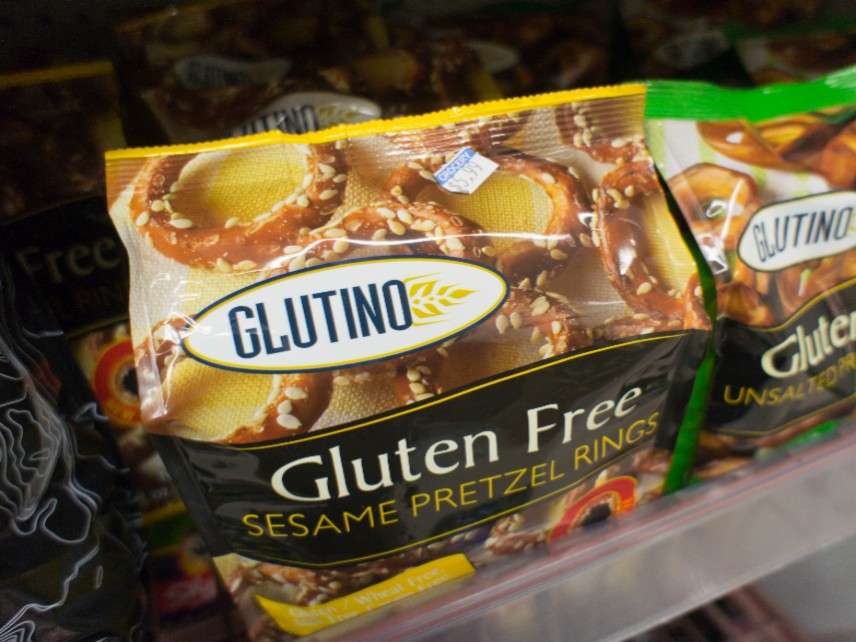Mandatory Allergen Labels Are a Double-Edged Sword
Allergen labeling is hard work that's done often, and often done wrong.

Edison Township, New Jersey, could become the first municipality in the nation to require restaurants and caterers operating there to post information about the presence of allergens in every dish they serve.
The proposed ordinance, included in a recent committee report, requires warnings for the eight foods for which the FDA requires warnings if the foods are packaged—including milk, eggs, and peanuts—as well as MSG (monosodium glutamate) and added sulfites (such as those found in wines).
"Edison Township Councilman Sam Joshi introduced the ordinance," reports radio station WCBS, "which would require thousands of establishments in the town and surrounding area to rework their menus and label all allergens for every dish and beverage they serve."
All told, the ordinance would apply to all of the more than 600 restaurants and hundreds of caterers that operate in Edison. Joshi says the ordinance would require restaurants to have on hand one copy of a special menu that allergy sufferers could request. Restaurants would have until February to comply with the ordinance, while caterers would have until October 1 to do the same.
Supporters of the controversial ordinance—including Councilman Joshi, who suffers from food allergies—claim the ordinance will cost little in terms of restaurateurs' and caterers' time or money, would help food-allergy sufferers immensely, and should be adopted around the country.
Food allergies are a real problem. And, as this fact sheet from the group Food Allergy Research & Education (FARE) makes clear, people with food allergies are most likely to encounter allergens while dining out. "Research suggests that close to half of fatal food allergy reactions are triggered by food consumed outside the home," FARE reports.
Joshi says the goal of his ordinance is to make Edison "the safest place to eat in the" nation.
But critics are lashing out at the proposal.
Most of the more than 250 commenters here, for example, argue the ordinance would increase costs and liability and drive businesses away from the town.
Though Joshi claims the ordinance would help restaurants lessen their liability, I think the critics are correct. Either through the regular changes that occur on menus daily (or weekly) in many restaurants, or through changes in suppliers (or the ingredients used by suppliers), or through some combination of these factors, the ordinance would likely heighten a food provider's liability. To mitigate this heightened liability would require restaurants and caterers to read all of the labels of all of the ingredients they're using every single time they receive a shipment—probably hundreds of times each year—lest they miss the unannounced addition of some new allergen to a food they've purchased for months or even years.
For many consumers, the ordinance also wouldn't likely solve the main problems it's intended to address. Worryingly, it wouldn't eliminate (and doesn't even appear to address) one major concern of those who suffer from severe food allergies: cross contamination. A person may be allergic to shellfish, for example, but not to fish (or vice versa). Yet a restaurant may prepare both on the same cutting board. Or a consumer may be allergic to peanuts (technically a legume) but not to tree nuts. And yet a restaurant may use the same food processor to blitz, say, both almonds and peanuts, even if they're not in the same dish together. In each of these examples, an allergy sufferer could become violently ill or worse. The Edison ordinance could give consumers dining there a false—and fatally flawed—sense of security.
The inclusion of MSG on the list is also puzzling, given that it's not a known allergen. The Mayo Clinic reports that "researchers have found no definitive evidence of a link between MSG and [a host of alleged] symptoms."
Generally, I support the FDA's mandatory allergen-labeling rules. Still, in previous writings here and elsewhere, I've pointed out a host of problems with adopting and enforcing allergy-labeling regulations. The FDA's gluten rules, for example, don't do enough to protect those with severe gluten allergies. And, as I explained in a lengthy piece for the New Food Economy last year—one in which I detailed surprising findings from a FOIA request I'd filed—overlapping USDA and FDA jurisdiction and related infighting and inertia can mean that important recalls of foods due to the presence of undeclared allergens may be delayed or slip through the cracks.
Allergen labeling is hard work that's done often, and often done wrong.
That brings us back to Edison, where Councilman Joshi, who was elected last year, stated during the election that "[t]he most important issue over the next few years will be Edison's continued economic growth." I don't doubt that's a key issue. But Joshi's allergen-labeling ordinance is a shortsighted effort that could cripple economic growth in Edison for years to come without making consumers and the food they eat much (or any) safer.
